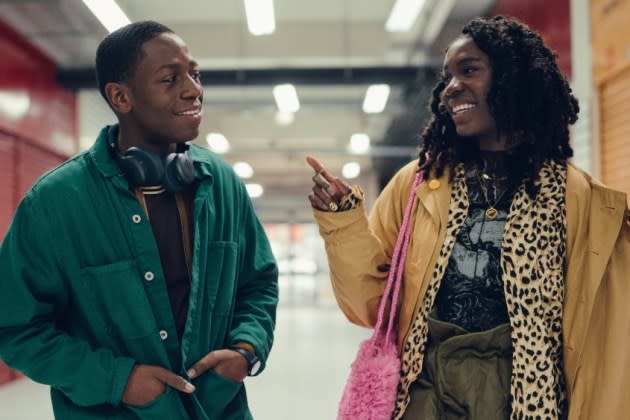‘Rye Lane’ Review: Long Unloved on Screen, South London Gets the ‘Notting Hill’ Treatment in an Effervescent Romcom
- Oops!Something went wrong.Please try again later.

Non-Londoners might think of the U.K. capital as a single city, the perceived interchangeability of its regions and locations evident in many a notionally London-set but geographically manic film where characters stroll from Chelsea Bridge to the heart of Soho in a matter of minutes. Residents know that its quadrants are so disparate as to be whole separate ecosystems, with the Thames River that separates north from south London a virtual equator running through the city.
Those who have toured the Big Smoke via the movies — in particular, the idealized, exportable London of Working Title trifles and “Paddington” pictures — are largely familiar with the most leafy, genteel streets of the north and west, with the increasingly bourgeois east lately getting a look-in. But the diverse, dynamic neighborhoods of the south have received less than their due on screen, which is where Raine Allen-Miller’s delightful romantic comedy “Rye Lane” aims to set things right.
More from Variety
David Jonsson, Vivian Oparah, Raine Allen-Miller Talk Sundance Hit 'Rye Lane'
CAA Signs 'Industry,' 'Rye Lane' Star David Jonsson (EXCLUSIVE)
Named for the street that forms the commercial spine of Peckham, and aiming to do for that once neglected — though now rapidly gentrifying — district of southeast London what Richard Curtis and Roger Michell did for Notting Hill back in the day, “Rye Lane” is an unabashed urban love letter, mooning over the parks, pubs and mix-and-match markets of its chosen locale at least as much as it does over the bright, open faces of the two young lovers at its center. Or lovers-to-be, for the bulk of its cheerfully fleet 82-minute runtime — not that Nathan Bryon and Tom Melia’s fast-talking script leaves us in any doubt as to their destiny from their first sweetly awkward meet-cute.
From there on, “Rye Lane” hits every expected beat of the modern romantic comedy, from seduction to confusion to brief separation to joyous reconciliation. Neither the director nor the writers (all feature first-timers) are out to subvert or redesign the genre, but rather to claim it for a demographic — specifically, young Black Britain — that U.K. cinema has rarely presented in such a kind or romantic light. Though sure to be enthusiastically embraced on home turf, this Searchlight Pictures release should translate easily enough abroad, turning industry heads toward its energetically talented makers, and hopefully making crossover stars of its leads David Jonsson and the especially incandescent Vivian Oparah.
Chemistry, the most essential and elusive romcom ingredient, spits and sparks between the two before they even come to face to face, in a cleverly engineered opening scene. Hearing shy accountant Dom (Jonsson) sobbing in a unisex bathroom stall in a makeshift Peckham art gallery, chatty aspiring costume designer Yas (Oparah) offers him some anonymous counsel before leaving him in peace — only to recognize his bubblegum-pink Converse kicks across the room minutes later. As they resume the conversation, it emerges that they’re both nursing recent breakups, Yas a little more stoically than Dom. And so the stage is set for an ambling life-in-a-day relationship story, as the two strangers walk and talk from Peckham to neighboring Brixton and back, crushing on each other all the while.
Into this framework, Bryon and Melia fit in a few constructed farcical setpieces — the quickest and funniest of which sees Yas posing as Dom’s steady girlfriend for a peacemaking meeting with his ex Gia (Karene Peter) and her dimwit new beau Eric (deadpan scene-stealer Benjamin Sarpong-Broni). A subsequent escapade involving breaking into Yas’s ex’s apartment is a little more strained and stretched, though it does nimbly incorporate the near-requisite karaoke scene that sees them adorkably duetting on Salt-N-Pepa’s “Shoop.” But “Rye Lane” is most winning at its most relaxed, revealing its two improbably compatible characters via limber, casually well-observed conversation.
As in such other contained, quick-start romances as “Before Sunrise” or “Brief Encounter,” this loose, gently contrived setup only works if we’re as into the characters as they are into each other, and Oparah and Jonsson are just about irresistible. His retiring, anxious energy smartly updates the diffident English romantic persona cultivated by the likes of Hugh Grant and Colin Firth — but with a timely hint of Gen-Z neurosis in the mix. It works in pleasing contrast to Oparah’s zesty, offbeat extroversion, which is saved from manic-pixie-dreamgirl cliché by salty quips and snappy delivery.
Together, they’re breezily, infectiously young, in a way that doesn’t smack of pandering or focus-grouping, but feels authentically drawn from the city’s sidewalks, while the film’s best writing plays like dialogue overheard in a café that you just have to write down. If the filmmaking occasionally strays into precious, gimmicky territory that the script and performances avoid — with Olan Collardy’s otherwise lithe, peppy lensing leaning a little too hard on wide-angle lenses — Cynthia Lawrence-John’s eclectic, sharply color-blocked costumes and Kwes’s silky neo-neo-soul score are perfectly on the money. And if “Rye Lane” slightly busts its formula by lurching past a hitherto tight one-day timeframe, you can hardly blame the film for wanting to spend more time with its eminently lovable lovers — or to send London’s under-loved south side one more rosy valentine.
Best of Variety
Sign up for Variety’s Newsletter. For the latest news, follow us on Facebook, Twitter, and Instagram.
